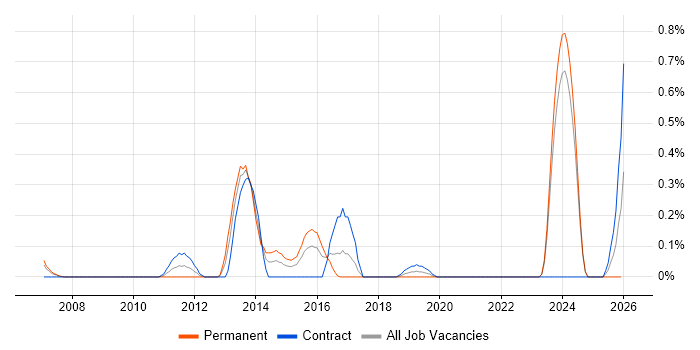Resource Description Framework (RDF)
Scotland > Glasgow
The table below provides summary statistics and salary benchmarking for jobs advertised in Glasgow requiring RDF skills. It covers permanent job vacancies from the 6 months leading up to 25 January 2026, with comparisons to the same periods in the previous two years.
| 6 months to 25 Jan 2026 |
Same period 2025 | Same period 2024 | |
|---|---|---|---|
| Rank | - | - | 135 |
| Rank change year-on-year | - | - | - |
| Permanent jobs citing RDF | 0 | 0 | 19 |
| As % of all permanent jobs in Glasgow | - | - | 1.15% |
| As % of the Processes & Methodologies category | - | - | 1.20% |
| Number of salaries quoted | 0 | 0 | 0 |
| Median annual salary (50th Percentile) | - | - | - |
| Scotland median annual salary | - | - | - |
All Process & Methodology Skills
Glasgow
RDF falls under the Processes and Methodologies category. For comparison with the information above, the following table provides summary statistics for all permanent job vacancies requiring process or methodology skills in Glasgow.
| Permanent vacancies with a requirement for process or methodology skills | 527 | 624 | 1,585 |
| As % of all permanent jobs advertised in Glasgow | 75.07% | 93.27% | 96.24% |
| Number of salaries quoted | 329 | 272 | 554 |
| 10th Percentile | £28,250 | £33,750 | £27,000 |
| 25th Percentile | £31,000 | £40,563 | £37,500 |
| Median annual salary (50th Percentile) | £50,000 | £55,000 | £52,500 |
| Median % change year-on-year | -9.09% | +4.76% | - |
| 75th Percentile | £65,000 | £75,000 | £65,000 |
| 90th Percentile | £85,000 | £97,250 | £77,500 |
| Scotland median annual salary | £42,750 | £55,000 | £50,000 |
| % change year-on-year | -22.27% | +10.00% | -13.04% |
RDF
Job Vacancy Trend in Glasgow
Historical trend showing the proportion of permanent IT job postings citing RDF relative to all permanent IT jobs advertised in Glasgow.

RDF
Salary Trend in Glasgow
Salary distribution trend for jobs in Glasgow citing RDF.

